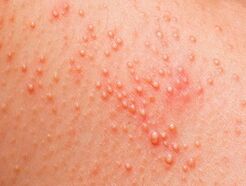Parasites are pathogenic organisms that cause humans, animals and even certain plants to inhabit. There are many types of organisms in the world that can penetrate the host's body, feed on its useful substances, actively multiply and leave waste in the body, leading to the development of various diseases.
Worms are most common in humans. They are worms of various lengths and sizes, mainly inhabiting the intestines of vertebrates. But some worms can migrate throughout the body, penetrating muscles, liver, heart, joints, lungs and even the brain.
Worms can harm the host's body, so everyone should know how to determine whether there are parasites in the body. However, many people do not want to go to the hospital, waste time and check for worms for no reason.
In this case, people can find out whether there are parasites in the body by paying attention to important criteria such as the characteristic symptoms of a certain helminth. What if they are not there? This will not happen!
However, in the early stage of worm invasion, the signs of life activities of foreign microorganisms are rarely expressed or completely disappeared. Since the larvae of the worm cannot parasitize the human body, the clinical situation becomes intense and obvious only when the worm is actively developing.
How to determine the presence of worms in the body without medical research?

Different types of parasites cause characteristic symptoms in the host. If discovered in time and decrypted correctly, the infection can be determined even at an early stage.
Therefore, the possibility of false diagnosis is minimized, which will allow the use of folk or medical antiparasitic agents for correct and effective deworming.
Therefore, in order to identify parasites in the human body, you need to pay attention to the following symptoms:
- Grind your teeth at night.
- Allergic rash-acne, acne, urticaria, herpes lips, eczema, erythema, papilloma, neurodermatitis, psoriasis, etc.
- The development of upper respiratory tract diseases (bronchitis, pneumonia, runny nose), which are typical features of asparagus and nematode diseases.
- Since long worms prevent the excretion of bile and pancreatic juice, abdominal distension and diarrhea may occur.
- Constipation occurs when the worm forms a ball that prevents the passage of the intestines.
- The migration of parasites causes joint and muscle discomfort.
- Severe irritability, caused by painful symptoms.
- Persistent dry cough cannot be treated with standard antitussives.
The body temperature was also observed to rise to sub-fever values. The causes of this condition may be allergies, blood poisoning, neurological diseases, abnormal internal organs and brain function, and anemia syndrome.

In addition, worms living in the human body will greatly reduce their immunity, so patients often catch colds. In addition, patients may be depressed for a long time due to body poisoning.
The characteristic symptoms of zx helminthiasis are nausea and vomiting, which are also caused by the release of toxic substances. In addition, certain types of worms can live in the human body and produce specific hormones that affect the intestinal flora, causing diarrhea.However, in some cases, these symptoms are not due to helminthiasis, as they are similar to signs of food poisoning. Although this can become a serious problem, the parasites can damage the host’s organs and systems for a longer period of time due to the late treatment.
Therefore, in order to detect helminthiasis at home, a test should be performed. To do this, you need to answer the following questions:
- Does the anus itch at night?
- Are the lymph nodes swollen?
- Is there a rash?
- How often does insomnia occur?
- Do you have vomiting and nausea?
- Do you have muscles and muscle pain?
- How often does flatulence occur?
- How often do you see bitterness in your mouth?
If a person gives seven affirmative answers to these questions, it is likely that his body is infected with a worm.
How to identify the type of worm disease by symptoms?

At home, you can determine which worms live in the human body. However, this can only be done when the parasitic disease has reached the active stage of its development.
The characteristics of othworm disease and bilobular flagellosis are the strongest neurological symptoms in young patients. Due to the influence of toxic substances on the nervous system, aggressive behavior and increased neuroticism will occur. For similar reasons, people who are infected experience migraines and dizziness.
Usually, trichinosis is accompanied by joint and muscle pain, as well as swelling of the face and eyelids. This is due to the special life of Trichinella, it lives in skeletal muscle. If you eat unheated wild animals or pork, you may be infected with this parasite.
Giardiasis can affect the function of the liver and kidneys and cause various allergic reactions. In addition, when a person's body is damaged by Lambethella, they suffer from arthritis, which is caused by intoxication. In addition, in an invasive patient, the immunity is weakened. In this case, the following diseases will develop:- Sinusitis;
- Stomatitis;
- There are many bacterial vaginosis.

The characteristic symptom of worm small intestinal helminthiasis is anal itching. In addition, most infected people will have gastrointestinal dysfunction.
Anemia syndrome is a characteristic of schistosomiasis. There are also manifestations of malnutrition (pathogenic microorganisms suppress the beneficial flora).
Suffering from bronchiectasis, fascia relaxation and aspirin biliary disease, the gallbladder is affected, and jaundice syndrome develops. In addition, in the course of these helminths, the liver and spleen increase.
Strongyloidiasis has many symptoms. Therefore, as it progresses, gastrointestinal tract dysfunction, dyspepsia and allergies appear.
How to determine if worm eggs can be obtained without laboratory conditions? When worms are in the reproductive stage, it is easy to find their presence in the body. To do this, you need to analyze the parasite eggs.
As aspirin disease develops, you can do the research yourself at home. For this, tape or tape must be applied to the skin of the anal area.
It’s best to do it as soon as you wake up in the morning. If a person suffers from amniotic tracheitis, then their eggs will be identified on the sticky surface of the tape.
Laboratory methods for detecting parasites
If the patient has more than three characteristic symptoms of helminthiasis, he should contact the medical institution so that the laboratory can determine whether there are parasites at home.

If a worm is suspected, the first step is to study feces. This allows you to identify tape eggs, worms and fluke eggs. However, in order to accurately confirm the diagnosis, the test must be performed 3 times every few days.
To determine the peristalsis of the small intestine, scrape around the anus. Similarly, for patients, one of the most accurate and convenient detection methods is ELISA, which allows you to detect blood antibodies produced by the human body when pathogenic microorganisms are parasitic.
Sometimes a bioresonance diagnosis is performed to study the frequency of parasites. This method is very useful because it can determine the state of the entire body. In addition, in addition to parasites, such research can also identify immune states that weaken immunity to identify other diseases and pathogenic fungi, bacteria, and viruses.






































